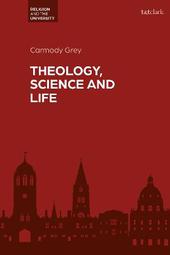
|
Theology, Science and Life
Hardback
Main Details
| Title |
Theology, Science and Life
|
| Authors and Contributors |
By (author) Dr Carmody Grey
|
| Series | Religion and the University |
|---|
| Physical Properties |
| Format:Hardback | | Pages:272 | | Dimensions(mm): Height 234,Width 156 |
|
| Category/Genre | Christian theology
Theology |
|---|
| ISBN/Barcode |
9780567708489
|
| Classifications | Dewey:261.55 |
|---|
| Audience | | Tertiary Education (US: College) | |
|---|
|
Publishing Details |
| Publisher |
Bloomsbury Publishing PLC
|
| Imprint |
T.& T.Clark Ltd
|
| Publication Date |
26 January 2023 |
| Publication Country |
United Kingdom
|
Description
Offering a bold intervention in the ongoing debate about the relationship between 'theology' and 'science', Theology, Science and Life proposes that the strong demarcation between the two spheres is unsustainable; theology occurs within and not outside what we call 'science', and 'science' occurs within and not outside theology. The book applies this in a penetrating way to the most topical, contentious and philosophically charged science of late modernity: biology. Rejecting the easy dualism of expressions such as 'theology and science', 'theology or science', modern biology is examined so as to illuminate the nature of both. In making this argument, the book achieves two further things. It is the first major English-language reception and application of the thought of philosopher Hans Jonas in theology, and it makes a decisive contribution to the unfolding reception of 'Radical Orthodoxy', one of the most influential schools in contemporary Anglophone theology.
Author Biography
Carmody Grey is Assistant Professor of Catholic Theology at Durham University, UK.
ReviewsThe question of life - the nature, meaning, and value of human and non-human life - is the most pressing of our time. Carmody Grey offers a potent challenge to any scientific monopoly over this question and opens up a compelling theological and philosophical exploration of life. This is a vital book. -- Simon Oliver, Durham University, UK With Theology, Science and Life, Carmody Grey has positioned herself at the forefront of the newly invigorated debates over the nature of life and the relation between theology, metaphysics and modern science as well as the effort to save organic life from the reductionism inherent in our established forms of analysis. I cannot recommend highly enough a close and careful reading of this rich and insightful book. It will transform the way one thinks about these vital questions and is destined to leave a lasting mark on the debate. -- Michael Hanby, The Catholic University of America, USA
|